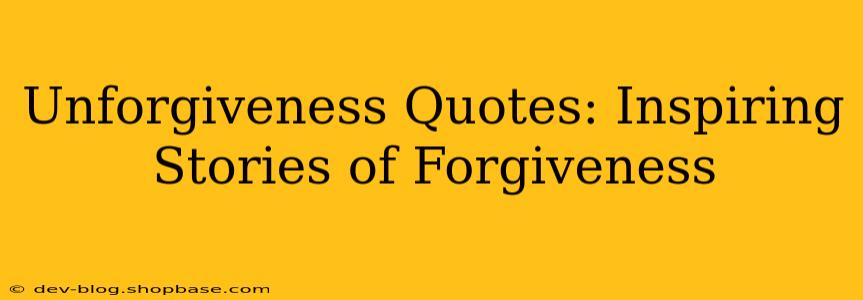Unforgiveness can be a heavy burden, weighing down our hearts and hindering our ability to move forward. But the power of forgiveness, both for ourselves and others, is transformative. This post explores the profound impact of unforgiveness through insightful quotes and inspiring stories, highlighting the journey towards healing and peace. We’ll delve into the reasons why holding onto resentment is harmful and examine strategies for letting go and embracing forgiveness.
What Happens When You Don't Forgive?
Holding onto unforgiveness can manifest in various ways, impacting our physical and mental well-being. It can lead to:
- Increased stress and anxiety: Constant replaying of negative events keeps the mind in a state of heightened alert, leading to chronic stress.
- Physical health problems: Studies have linked unforgiveness to an increased risk of heart disease, high blood pressure, and other health issues.
- Depression and isolation: Resentment can create a sense of bitterness, isolating individuals from relationships and support systems.
- Impaired cognitive function: The emotional burden of unforgiveness can affect memory, concentration, and decision-making abilities.
It's crucial to understand that unforgiveness isn't about condoning harmful actions; it's about releasing the emotional grip these actions have on you.
Inspiring Quotes on Forgiveness
Many wise individuals have eloquently captured the essence of forgiveness. Here are some powerful quotes that highlight its importance:
- "Forgiveness is not an occasional act, it is a permanent attitude." - Martin Luther King Jr. This emphasizes that forgiveness is a continuous process, not a one-time event.
- "The weak can never forgive. Forgiveness is the attribute of the strong." - Mahatma Gandhi. This highlights the strength and maturity required to let go of resentment.
- "Holding on to anger is like grasping a hot coal with the intent of throwing it at someone else; you are the one who gets burned." - Buddha. This quote powerfully illustrates the self-destructive nature of unforgiveness.
What are the Benefits of Forgiveness?
Forgiving others – and, crucially, forgiving yourself – brings a multitude of benefits:
- Reduced stress and anxiety: Letting go of resentment allows for emotional release and a sense of peace.
- Improved physical health: Studies show that forgiveness is associated with better cardiovascular health and reduced blood pressure.
- Stronger relationships: Forgiveness paves the way for healthier, more fulfilling relationships.
- Increased self-compassion: Forgiving yourself allows for self-acceptance and reduces self-criticism.
- Greater emotional well-being: Forgiveness fosters a sense of freedom and emotional liberation.
How Can I Forgive Someone Who Has Hurt Me?
Forgiveness is a journey, not a destination. It's a process that often takes time and effort. Here are some steps to consider:
- Acknowledge your feelings: Allow yourself to feel the pain and anger without judgment.
- Understand the other person's perspective: Try to see things from their point of view, even if you don't agree with their actions. This doesn't excuse their behavior, but it can help you understand it.
- Practice empathy: Try to understand the circumstances that might have contributed to their behavior.
- Let go of the need for revenge: Holding onto resentment fuels negativity and prevents healing.
- Focus on your own well-being: Prioritize your emotional and mental health. Engage in activities that bring you joy and peace.
- Consider professional help: If you're struggling, a therapist or counselor can provide support and guidance.
Is it Possible to Forgive Yourself?
Self-forgiveness is just as important as forgiving others. Many people struggle with self-criticism and regret. To forgive yourself:
- Acknowledge your mistakes: Don't try to deny or minimize your actions.
- Learn from your mistakes: Use your experiences as opportunities for growth and self-improvement.
- Practice self-compassion: Treat yourself with the same kindness and understanding you would offer a friend.
- Focus on your positive qualities: Remind yourself of your strengths and accomplishments.
- Let go of guilt and shame: These emotions only serve to hinder your progress.
Inspirational Stories of Forgiveness
(This section would ideally include several short, compelling anecdotes illustrating the power of forgiveness. These could be from personal experiences, historical events, or well-known stories. Due to the limitations of this text-based format, I cannot provide specific examples. However, consider including stories that showcase the positive transformation resulting from choosing forgiveness over resentment.)
Conclusion: Embracing the Journey of Forgiveness
The path to forgiveness is not always easy, but the rewards are immeasurable. By understanding the impact of unforgiveness and embracing the power of letting go, we can unlock a path to greater peace, well-being, and stronger relationships. Remember, forgiveness is not about condoning harmful actions, but about releasing yourself from the burden of resentment and choosing healing over hurt.

